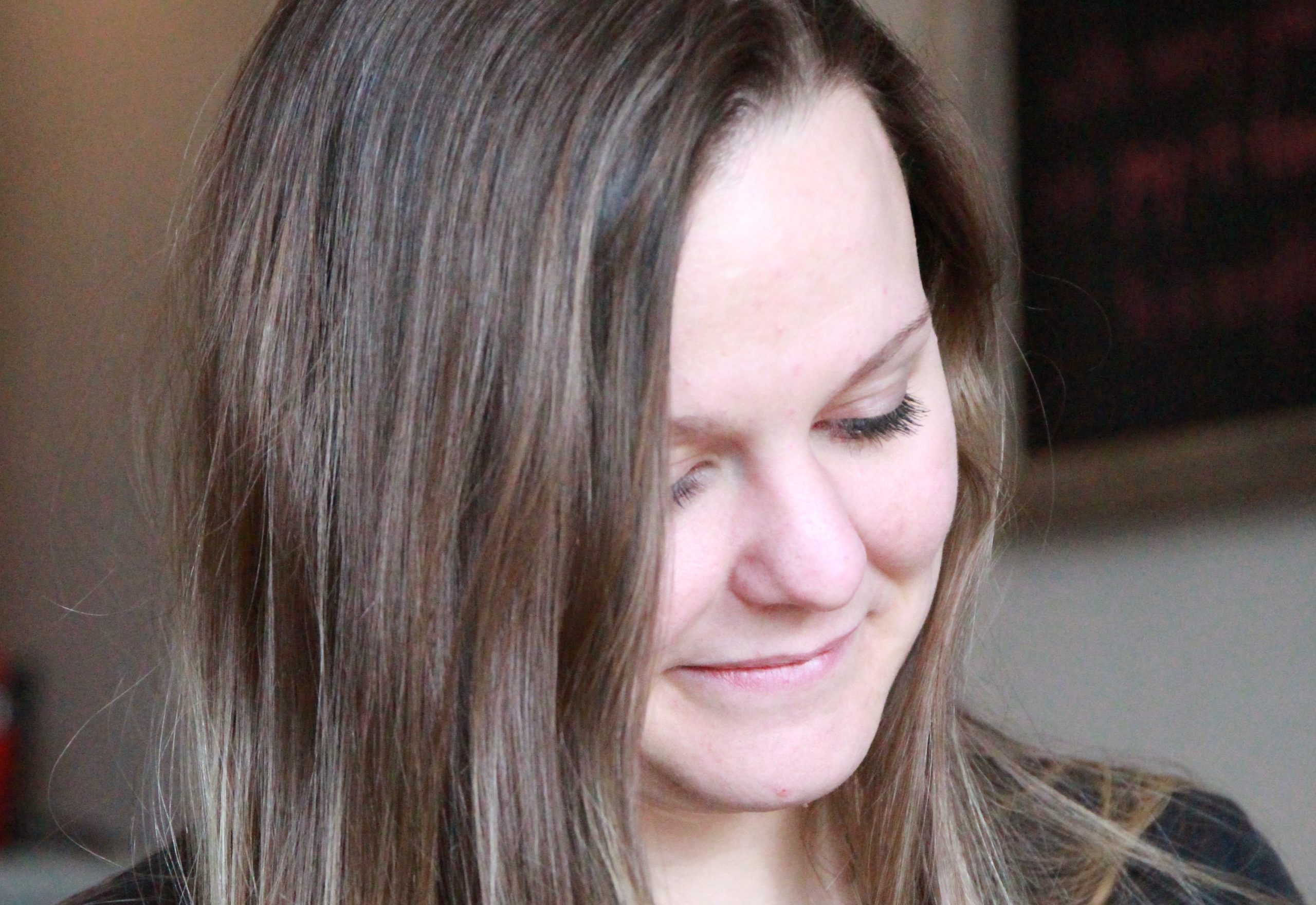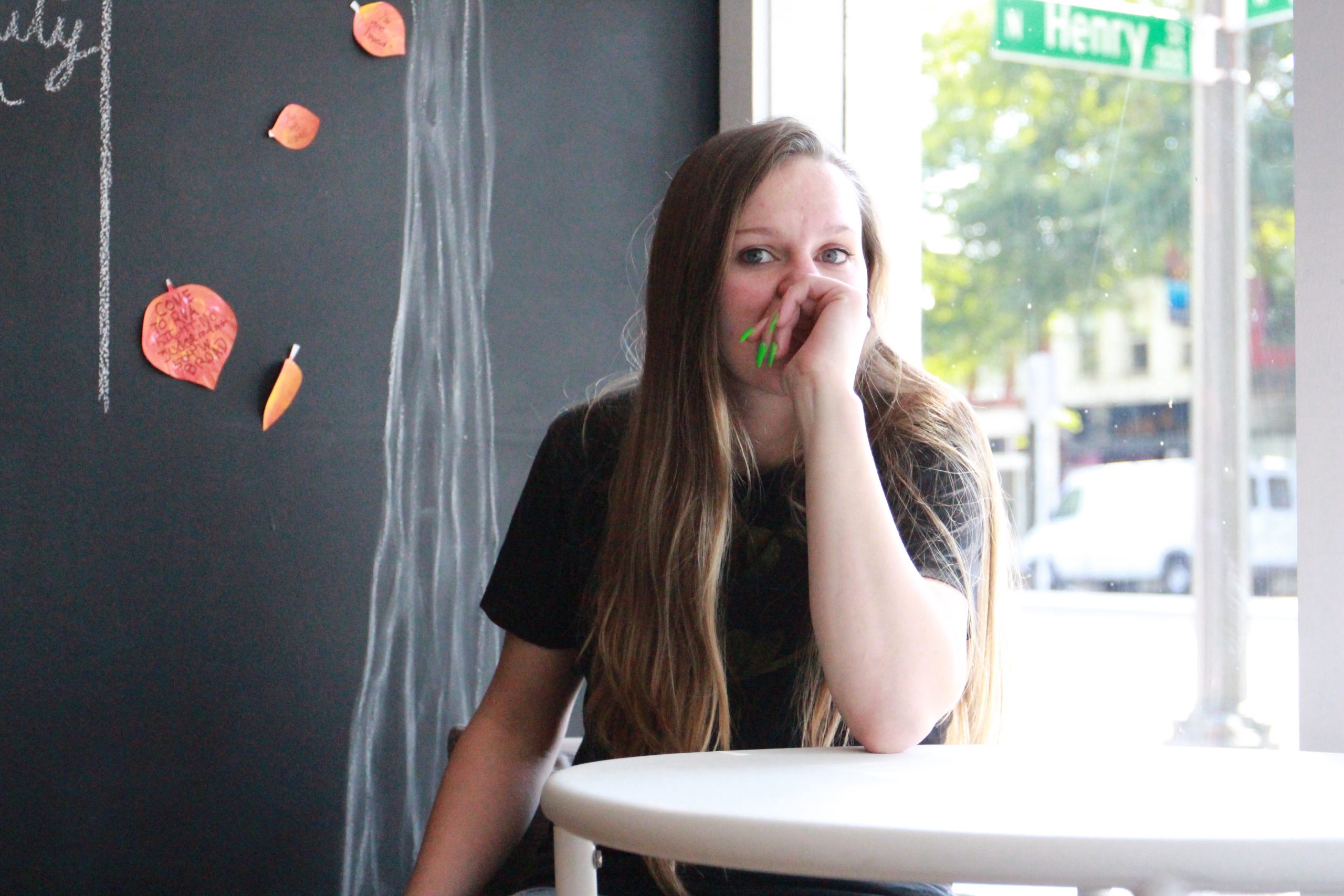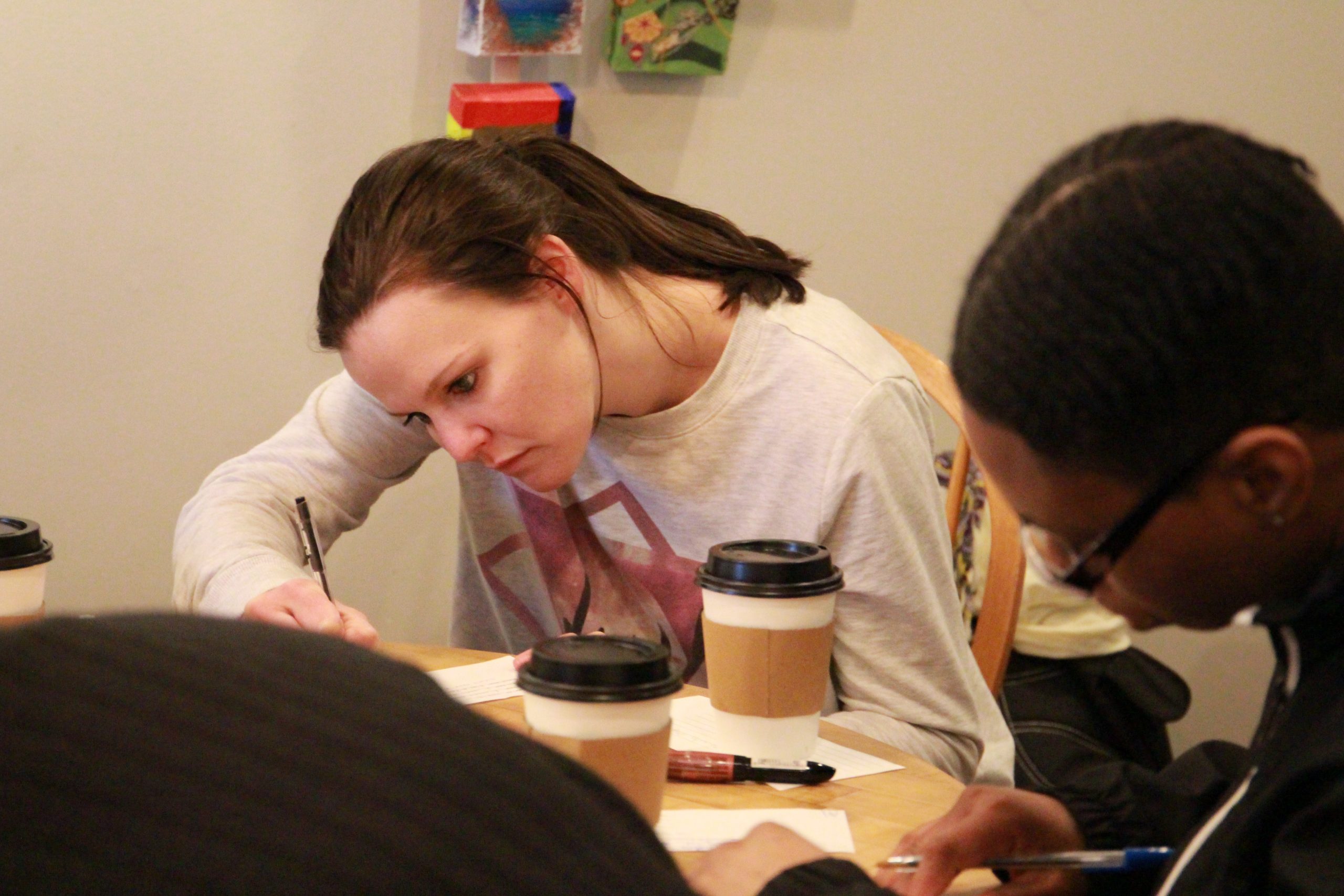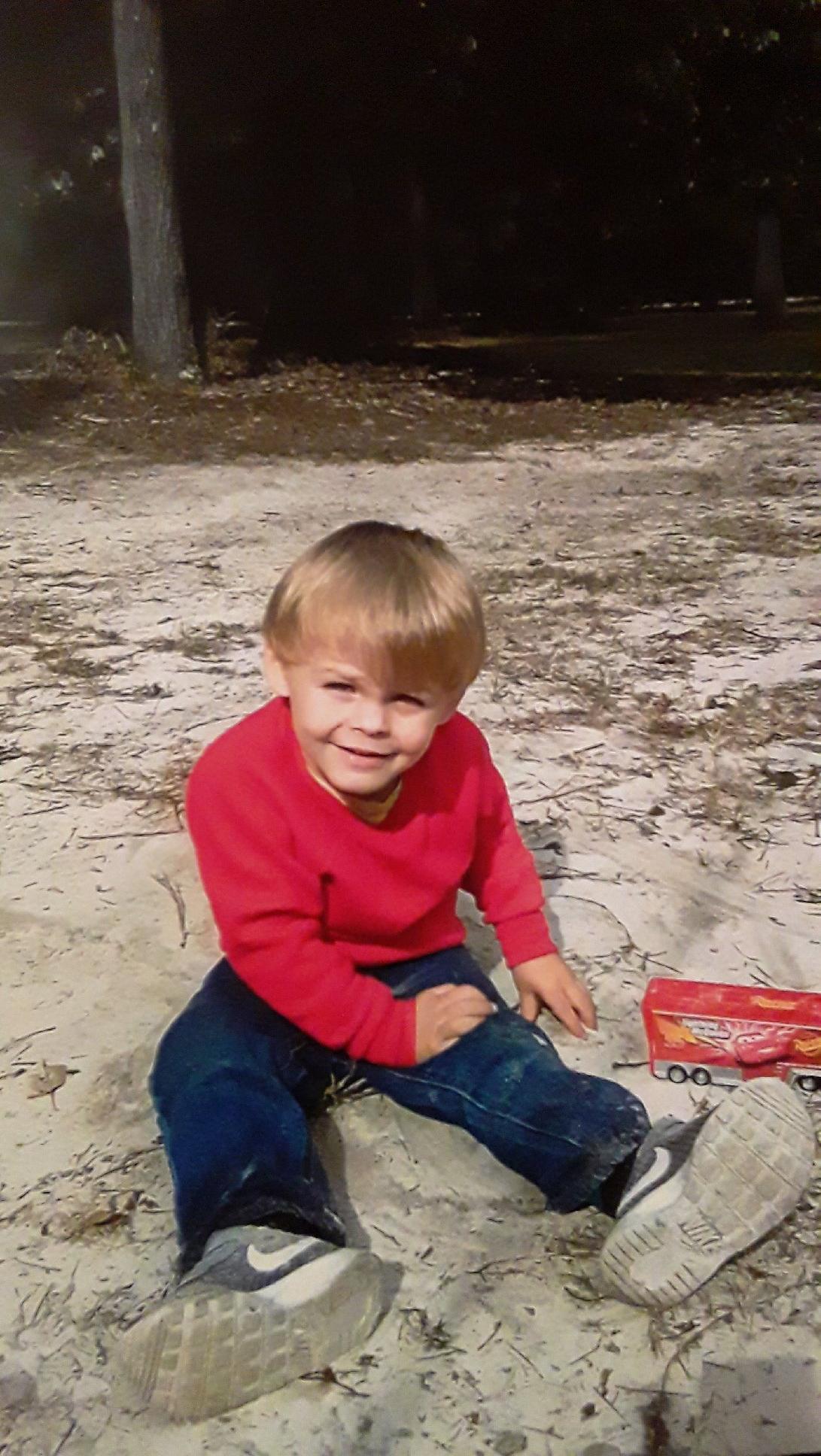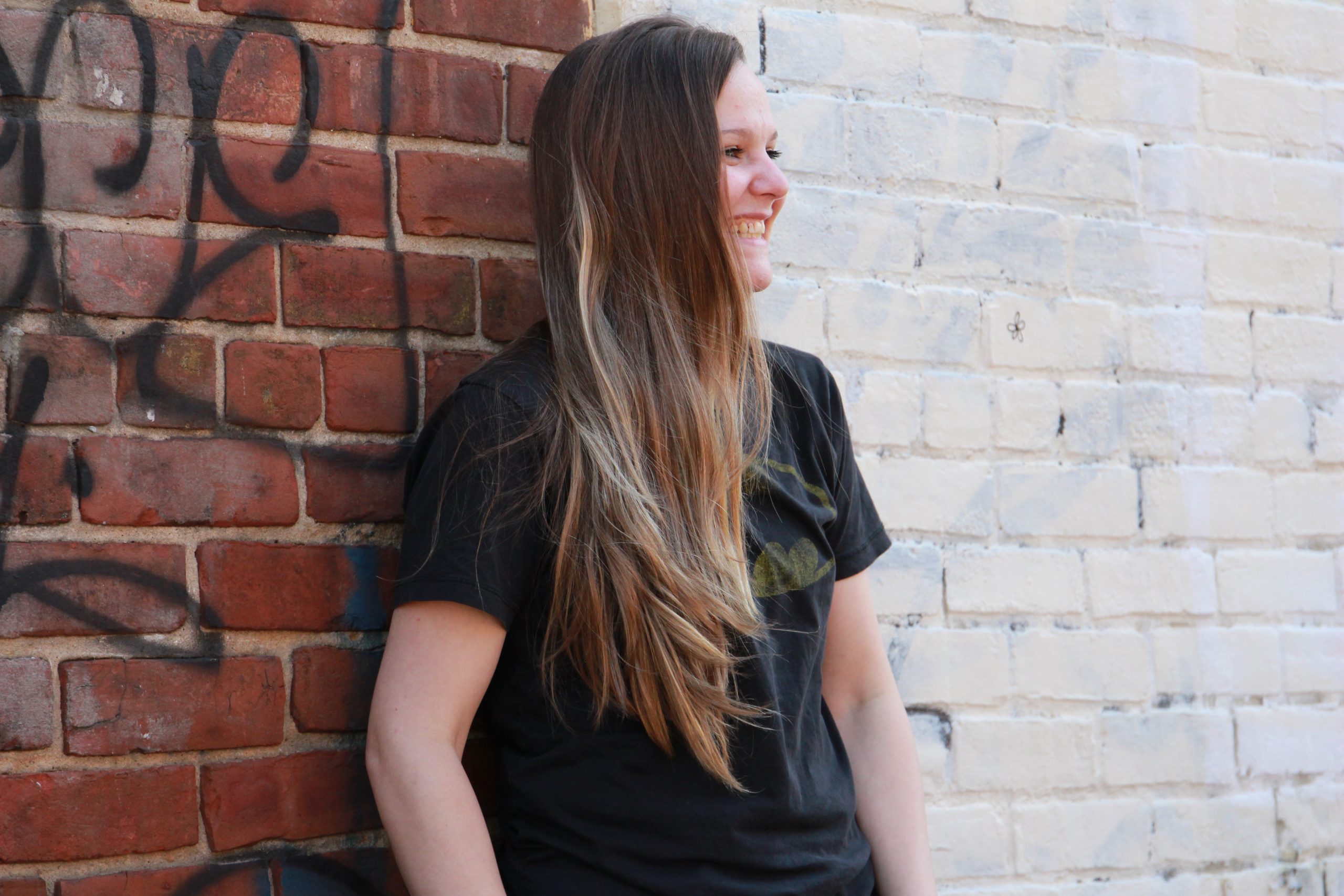Writing and Photos by MiJin Cho
The following is a written narrative of a woman named Elizabeth Bellamy. She is a daughter of a single-parent household, a mother of one, a survivor of substance abuse, and a believer in trauma-informed care. Through the REAL (Recovery from Everyday Addictive Lifestyles) Life Program of Richmond, Bellamy shares an anecdote about fear, hope, and perspective — an accumulation of short stories that build her narrative, her life, and her philosophy. Although I can’t capture the full essence of Bellamy’s life experiences, I aim to convey a small portion of her life in order to capture her humanity.
Fear, for 28 year old Elizabeth Bellamy, begins with a loss of hope–hope that succumbs to the pressure of overwhelming expectations. This fear often stops Bellamy from attempting success, hesitating in the wake of a possible imminent failure.
“My biggest fear? Failing. At life, at my recovery, getting a career and not being successful with it. I guess I haven’t really had much experience at success so I still question myself, whether or not I can do it. I mean, in order to find out, I have to try,” Bellamy said.
Growing up in Poquoson, VA, Bellamy strutted proudly through her grandmother restaurant, Owen’s Marina, wading between the kitchen ingredients and the finished cuisines. She was the confident, young daughter of a single-parent household, spending most of her days with her father and older sister near the coast of the Chesapeake Bay. However, removed from the safety of her family, a new feeling of self-doubt trickled its way into a 10-year old Elizabeth Bellamy as she encountered unwarranted judgement and bullying from classmates in the fourth grade.
“I really dreaded school,” Bellamy said. “I mean, I got held back. I had trouble reading. People just picked on me. Even in lower grades. It followed me into high school because it was a small town. Yeah, a small town and a lot of people who were stuck up — that’s just how it was then.”
The bullying intensified over the years. By the time she entered Poquoson High School, Bellamy was forced to quit her passion for cheerleading, a sport she loved since the age of 12, due to the alienation.
“When I got to high school, I did one year of JV cheerleading and then I stopped going,” Bellamy said. “I mean, I was good at it. And I stuck to it for a while; it made me realize that when I do something, like I can actually be good at it. But I didn’t fit in with all the people who were on the squad, I wasn’t considered popular hanging out with them. So I’d get picked on. I wanted to escape school and get out of it. I would skip. I started skipping school and getting in trouble and doing things I wasn’t supposed to. It was really hard. It was really, really hard. And then I still struggle with that to this day.”
Escaping the brutal treatment from classmates and the pressure of school, along with the influence of a new boyfriend, Bellamy turned towards smoking cigarettes and excessive drinking for immediate alleviation of stress.
“Well, I started out smoking cigarettes, drinking, smoking weed, around like 14, I guess. When I was 16, or 17, that’s when I tried prescription drugs. That was through the boyfriend. But I mean, I’ve made those decisions for myself. I progressed from prescription pills to heroines, and I just lost control after that. It was all I thought about. That’s what kept me going, just chasing after the drug. It numbed my feelings, I didn’t have to feel things,” Bellamy said.
Sitting down next to the glass windows at RVA Light Cafe, Liz Bellamy recalls memories of peer alienation and prescription drug usage as an adolescent. The trauma from her past, along with the encouragement from a parental figure, had pushed Bellamy into using substances during her childhood years to repress the unwanted feelings associated with the bullying at school. “Drugs were all I thought about. It kept me going — just chasing after the drug. It numbed my feelings,” Bellamy said.
Bellamy’s dependence on substance use grew as she began experimenting with stronger drugs with her sister and her distant mother. The commonality in their usage further normalized the situation, creating a level of acceptance for substance abuse as a family.
“Nobody told me when I was younger that my mom was on drugs, what she was doing, and why she wasn’t living successfully. I was totally unaware of all of that. So when my sister and I started using with her, I guess it kind of made me feel like it was okay. It distorted my way of thinking and the way that I viewed things and what I thought was normal or not normal,” Bellamy said.
By the time she was 16, Bellamy was an addict. She relied on substances to fuel her through the day, unable to abstain from the immediate reward mechanism. The reliance disoriented and impaired Bellamy’s behavioral and emotional response to situations, until one day, she reacted to an intense argument over the phone with her significant other with violence, breaking furniture around her. She wouldn’t, and couldn’t, her chaotic rage. She went on to severely damage her father’s property, kicking down windows and assaulting the law enforcement officers who arrived at the scene, until she was handcuffed. The incident marked the beginning of Bellamy’s time in incarceration.
“Merrimac Detention Center? I was scared to death. I didn’t know what I would be walking into. I didn’t know what the girls were like. I always viewed it being like what they said on the TVs and it was not like that. I was 16, and there were a bunch of like 10-, 11-, 12-year olds in there. It was weird. I was not expecting that. It was just like a daycare. Like you went to school, you ate lunch, they fed you good. You had little pod party. I went back to my dad’s house and I was supposed to not have any contact with my boyfriend and I was on house arrest. I didn’t abide by any of that. So that led me to go back again,” Bellamy said.
The cycle of incarceration repeated itself, lending itself to one of the most dangerous concepts in institutionalization: comfort. The greater number of times Bellamy was incarcerated, the more comfortable she felt in the detention structure, the pod (her unit within the center), and the judicial system, until she developed a form of co-dependency with the center.
“I knew everybody there. I knew there was always going to be people that I knew. I didn’t have to worry about anything else. I had somewhere to live, I had food, I didn’t have to pay rent. I just got accustomed to… being institutionalized. I just had a lot more stress on me when I get out. I have to worry about all these things that had to get done. I’d overwhelm myself and try to put too many things on my plate and I couldn’t get all of it accomplished. I just, I didn’t want to go to anything that anybody suggested for me. I didn’t like authority. So I wanted to book against everything that they had for me,” Bellamy said.
Writing positive affirmations, Liz Bellamy is one of the 25 women in the RL Expectant Mothers Program. The Expectant Mothers Program works with women in drug recovery to empower and build solidarity in a collective endeavor. “With the Real Life Program, I am currently getting my ID, social security card, and my birth certificate. So you know, just taking it one day at a time,” Bellamy said.
Her attitude towards the Virginia Peninsula Regional Jail, however, changed drastically at 26 years-old, when she gave birth to her now 2-year-old son, Grayson.
“The last two times I was incarcerated had been the hardest times. It wasn’t comfortable. I was not okay, I was depressed. I was scared. You know, I just wanted to be with my son and my family. I had a lot more to lose,” Bellamy said.
Recovery began with Grayson. Bellamy enrolled in and completed the We Are In This Together (WAITT) program, a program that focuses on modifying drug and stimulant-seeking behavior in favor of alternative coping mechanisms, in the Virginia Peninsula Regional Jail (VPRJ). As a graduate of the WAITT program, Bellamy officially joined the Recovery from Everyday Addictive Lifestyles (REAL) addiction program and its respective women’s recovery home on Sept. 27th, working on her addiction, finding employment, and gaining custody of her son, Grayson, and her newborn daughter, Shayna Marie Bellamy.
Four days into the program, Bellamy lost her two-month-old baby girl, Shayna. The news of Shayna’s passing shocked Bellamy and forced her to halt in her restorative process. However, she refused to stop. Instead, she looked towards Shayna’s passing as her “dragonfly”: a source of emotional and mental maturity and a deeper understanding of life.
“The night Shayna passed away, there were dragonflies everywhere,” Bellamy said. “I heard the news from the baby’s father and I saw a dragonfly that night when I was outside the courthouse after the sentencing for the recovery home. If you look up the meaning, dragonflies symbolize change, adaptability, self-realization, and transformation in almost every part of the world. Shayna plays a big role in who I am now, my spiritual aspect.”
Presenting a photo of her two-year-old son, Bellamy speaks about the influence of her immediate family on her recovery. More specifically, the birth of her son, Grayson, and daughter, Shayna, have each shaped her role as a mother, a friend, and a family member. “My happiest moments are when all of my family are together. Growing up, my mom wasn’t around so I always wanted all of us to be together. I wanted us to stick together. But unfortunately, that doesn’t always happen,” Bellamy said.
Through the process, Bellamy has developed an anewed way of thinking — making decisions based on herself, before others around her.
“I always make the same decisions based on whether or not everybody else was going to be happy about it. Just to make everybody else comfortable, and I’d just disregard myself. So going through that, I’m learning to put myself first in a positive way, because, I mean, I have to. Like you have to put yourself first so you can better yourself, so you can be better for your child. You can’t, you know, put everybody before you because you’re not going to get anywhere. And so that’s how I’m trying to live now. I’m trying to make decisions on what’s going to be best for me,” Bellamy said.
Bellamy’s new mentality of empowering herself before others has strengthened her understanding of herself and her past traumas. In some ways, this heightened insight into her old and new scars has become the source of one of Bellamy’s greatest strengths. She is able to build on her own metacognition: thinking about the way she thinks now based on the experiences of her past.
“I didn’t really ever think [the bullying at school] was that big of a problem, but I am noticing as I’m getting older that I’ve denied it for so long, I still think about it to this day,” Bellamy said. “I am figuring out how it’s followed me how it’s affected me throughout my life up until this age. It’s good to have an answer to why you’re doing the things you’re doing. Instead of walking around blindsided, like you don’t know what’s going on and you don’t have an answer. But you know, there’s a reason why you’re doing these things and there is a solution. It gives you hope to know that you know it can be fixed and you can deal with it. You can’t keep pushing it off because it just doesn’t go away. You’ve got to face it.”
Today, Bellamy carries this resolution, this hope, this dragonfly, inside of her. It shows as she speaks about a future as a peer recovery specialist, aspiring to help others live without the pressure of addiction. The renewed resilience will continue to guide her as she battles for recovery and building the confidence to face each of her fears.
“Right now, I want to be able to help other people who’ve been through what I’ve been through,” Bellamy said. “Because so many people have helped me and I want to be able to give back. I want to be in a job that I love, so if I’m doing stuff like that, it makes me feel good, and I feel like I’d be complete.”

